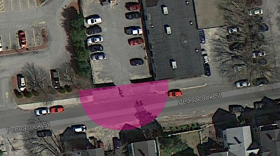While New Hampshire lawmakers passed and Governor Maggie Hassan signed a bill allowing for buffer zones outside facilities that provide abortions in New Hampshire, the U.S. Supreme Court was considering whether a Massachusetts law on buffer zones was constitutional.
On Thursday, the high court made its ruling.
John Greabe teaches constitutional law at the University of New Hampshire School of Law.
He explains the ruling and what impact it may have on New Hampshire’s law.
Brady Carlson: Governor Hassan noted in her statement today about the decision that New Hampshire’s law is different from the one in Massachusetts. How different are we talking?
John Greabe: It’s different in several respects. First of all, the law that was struck down today by the Supreme Court created a 35-foot buffer zone around facilities that perform abortions. New Hampshire’s law creates a 25-foot zone.
From the analysis in the majority opinion, the fact of ten feet in difference may well be a material difference in a future case.
BC: Now the court was unanimous in part of its ruling, at least in striking down the Massachusetts law. What was the fundamental objection that the justices had there?
JG: The court was unanimous in concluding that the Massachusetts law was unconstitutional. But it was pretty closely divided on how to get to that conclusion. The majority of five – featuring the same majority interestingly that voted to uphold the bulk of Obamacare last year, so it was Chief Justice Roberts with the four more liberal justices on the court – those five combined to say that they did not believe the law singled out anti-abortion speech on the basis of content or viewpoint.
They simply thought that the law went too far in trying to accomplish the legitimate purposes that it was written to accomplish.
The four justices who wrote separately who concurred in the judgment would have gone further and would have said that in fact they believe that the law discriminated on the basis of the content of the speech and therefore violated the First Amendment on its face.
BC: And that five-justice majority that you mentioned said that states could try other methods to try to prevent potential harassment or violence, rather than prescribing a buffer zone. What did they suggest and does that play here in New Hampshire at all?
JG: They suggest a couple things. First, they took note of the fact that there’s already a federal statute that makes it illegal to obstruct access to facilities that perform abortions. And they talked about a provision in the Massachusetts law that accomplished the same thing. And they raised questions about whether that in and of itself might be enough to accomplish the state’s purposes. Because they did take as given the fact that indeed the Massachusetts law does interfere with important speech rights.
The New Hampshire law’s a little bit different. We already mentioned the fact that the New Hampshire law has a 25-foot buffer zone rather than the 35-foot buffer zone in the Massachusetts law.
The New Hampshire law also contains certain factual findings that were made during the pendency of this case. So the New Hampshire law might be regarded a little bit more narrowly tailored. In particular, the New Hampshire legislature emphasized the fear and intimidation factor, which was not an interest that was put forth as sort of a principal justification for the Massachusetts law.
One other distinction is that the Massachusetts law actually contained criminal sanctions, where the New Hampshire law at first requires a warning and then imposes only a civil penalty and not criminal sanctions.
BC: New Hampshire’s law is set to take effect next month, July 10. That was true yesterday and that’s still true after this ruling. Or does that change at all?
JG: Nope, that’s still true, but the landscape has changed and the law might be regarded as constitutionally vulnerable. There are certainly portions of the majority’s decision that somebody wishing to challenge the New Hampshire law could invoke. In particular, it was really important to the majority that the Massachusetts law made it difficult for people to get close to women who were entering the facilities so that they could converse with them in a conversational tone and extend in their hand literature to those people. I think the emphasis in the majority opinion on that ability to get close and the related questioning or whether or not buffer zones are really an appropriate way to achieve the state’s purposes. I think that language could well be relied on by people who wish to challenge New Hampshire’s law.
But the Supreme Court’s ruling in no way directly speaks to New Hampshire’s law. What would have to happen is after the law goes into effect, somebody would have to challenge it in court and then this case would obviously become a very important precedent as the court turns its attention to whether in fact New Hampshire’s law complies with the First Amendment.







